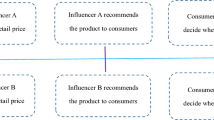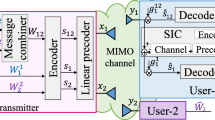Abstract
The focus of this paper is on a wireless cooperative network architecture, where a group of users exploits short-range wireless links to share the costs of a cellular download. To maximize the efficiency of the communication system, an optimization of parameters such as download time, monetary cost, and energy consumption can be implemented. Following this approach different portions of data shall be assigned for download to the involved users, which will then cooperatively exchange the contents on the short-range link. However, the policy of task assignment to the user terminals has a direct influence on the payoff of the single users, raising fairness issues in real implementation scenarios. Focusing on the energy savings introduced by the wireless cooperative network, in this paper we address the fairness issue by relying on game theoretic bargaining solutions. These solutions, have intrinsic properties to nicely model the duality between fairness and efficiency in the performances. An optimal trade-off algorithm between efficiency and fairness is then introduced, allowing the service coordinator to select the most appropriate bargaining solution and energy savings allocation under different constraints on fairness.






Similar content being viewed by others
References
Badia, L., Lindstrom, M., Zander, J., & Zorzi, M (2004). An economic model for the radio resource management in multimedia wireless systems. Computer Communications, 27, 1015–1028.
Campolo, C., Iera, A., Militano, L., & Molinaro, A. (2008). Dynamic bargaining of content shares in wireless cooperative systems. In IEEE International symposium on personal, indoor and mobile radio communications (PIMRC), Cannes, France.
Campolo, C., Iera, A., Militano, L., & Molinaro, A. (2012). Scenario-adaptive and gain-aware content sharing policies for cooperative wireless environments. Computer communications, 35, 1259–1271.
Camps-Mur, D., Garcia-Saavedra, A., & Serrano, P. (2013). Device to device communications with wifi direct: Overview and experimentation. IEEE Wireless Communications Magazine, 96–104. doi:10.1109/MWC.2013.6549288.
Dohler, M., Meddour, D. E., Senouci, S. M., & Saadani, A. (2008). Cooperation in 4G hype or ripe? IEEE Technology and Society Magazine, 27, 13–17. doi:10.1109/MTS.2008.918035.
Fattahi, A. R., & Paganini, F. (2005). New economic perspectives for resource allocation in wireless networks. In IEEE American Control Conference.
Fitzek, F., & Katz, M. (Eds.) (2006). Cooperation in wireless networks: Principles and applications—Real egoistic behavior is to cooperate! ISBN:1-4020-4710-X. Berlin: Springer.
Goemans, M., Li, L., Mirrokni, V., & Thottan, M. (2006). Market sharing games applied to content distribution in ad hoc networks. IEEE Journal on Selected areas in Communications, 1020–1033. doi:10.1109/JSAC.2006.872884.
Iera, A., Militano, L., Romeo, L., & Scarcello, F. (2011). Fair cost allocation in cellular-Bluetooth cooperation scenarios. Transactions on Wireless Communications, 10, 2566–2576. doi:10.1109/TWC.2011.052511.100749.
Jain, R., Chiu, D., & Hawe, W. (1984). A quantitative measure of fairness and discrimination for resource allocation in shared systems. Technical report, Digital Equipment Corporation, DEC-TR-301.
Kalai, E., & Smorodinsky, M. (1975). Other solutions to Nash’s bargaining problem. Econometrica, 43, 513–518.
Li, D., Xu, Y., Wang, X., & Guizani, M. (2011). Coalitional game theoretic approach for secondary spectrum access in cooperative cognitive radio networks. IEEE Transactions on Wireless Communications, 10, 844–856.
MacKenzie, A., & DaSilva, L. (2006). Game theory for wireless engineers. San Rafael, CA: Morgan & Claypool.
Militano, L., Condoluci, M., Araniti, G., & Iera, A. (2012). Bargaining solutions for multicast subgroup formation in LTE. In IEEE 76th vehicular technology conference fall (VTC-Fall) (pp. 1–5), Quebec City, Canada.
Militano, L., Condoluci, M., Araniti, G., & Iera, A. (2013). Multicast service delivery solutions in LTE-advanced systems. In IEEE international conference on communications (ICC), Budapest, Hungary.
Militano, L., Fitzek, F., Iera, A., & Molinaro, A. (2010) Network coding and evolutionary theory for performance enhancement in wireless cooperative clusters. European Transactions on Telecommunications, 21, 725–737. doi:10.1002/ett.1435.
Militano, L., & Iera, A. (2012). Adopting bargaining solutions for Bluetooth-based user cooperation. In IEEE international symposium on personal, indoor and mobile radio communications (PIMRC), Quebec, Canada.
Militano, L., Iera, A., Molinaro, A., & Fitzek, F. H. P. (2008). Wireless peer-to-peer cooperation: When is it worth adopting this paradigm? In International symposium on wireless personal multimedia communications (WPMC).
Militano, L., Iera, A., Molinaro, A., & Scarcello, F. (2013). Energy saving analysis in cellular-WLAN cooperative scenarios. IEEE Transactions on Vehicular Technology. doi:10.1109/TVT.2013.2270315.
Militano, L., Iera, A., & Scarcello, F. (2013). A fair cooperative content-sharing service. Computer Networks, 57, 1955–1973. doi:10.1016/j.comnet.2013.03.014.
Nash, J. (1950). The bargaining problem. Econometrica 21, 128–140.
Niyato, D., & Hossain, E. (2008). A noncooperative game-theoretic framework for radio resource management in 4G heterogeneous wireless access networks. IEEE Transactions on Mobile Computing, 7, 332–345.
Nurminen, J., & Nonen, J. (2008). Energy-consumption in mobile peer-to-peer quantitative results from file sharing. In Consumer communications and networking conference 2008, CCNC (pp. 729–733). doi:10.1109/ccnc08.2007.167.
Paek, J., Kim, J., & Govindan, R. (2010). Energy-efficient rate-adaptive GPS-based positioning for smartphones. In 8th international conference on Mobile systems, applications, and services, MobiSys, San Francisco, USA.
Roth, A. (1979). Axiomatic models of bargaining. Berlin: Springer.
Rubinstein, A., Safra, Z., & Thomson, W. (1992). On the interpretation of the Nash bargaining solution and its extension to non-expected utility preferences. Econometrica, 60, 1171–1186.
Saad, W., Han, Z., Debbah, M., & Hjørungnes, A. (2009). A distributed coalition formation framework for fair user cooperation in wireless networks. IEEE Transactions on Wireless Communications, 8, 4580–4593.
Sediq, A., Gohary, R., & Yanikomeroglu, H. (2013). Optimal tradeoff between sum-rate efficiency and jain’s fairness index in resource allocation. IEEE Transactions on Wireless Communications (to appear).
Srinivasan, V., Nuggehalli, P., Chiasserini, C., & Rao, R. (2003). Cooperation in wireless ad hoc networks. In Proceedings of IEEE INFOCOM.
Srivastava, V., Neel, J., MacKenzie, A., Menon, R., DaSilva, L., Hicks, J., et al. (2005). Using game theory to analyze wireless ad hoc networks. IEEE Communications Surveys and Tutorial, 7, 46–56.
Suris, J. E., DaSilva, L. A., Han, Z., & MacKenzie, A. B. (2009). Asymptotic optimality for distributed spectrum sharing using bargaining solutions. IEEE Transactions on Wireless Communications, 8, 5225–5237.
The Bluetooth Special Interest Group. (2004). Specification of the bluetooth system, version: 2.0 + EDR.
Touati, C., Altman, E., & Galtier, J. (2006). Generalized nash bargaining solution for bandwidth allocation. Computer Networks, 50, 3242–3263.
von Neumann, J., & Morgenstern, O. (1944). Theory of games and economic behavior (2nd ed. 1947, 3rd ed. 1953). USA: Princeton University Press.
Wu, Y., Wang, B., Liu, K., & Clancy, T. (2009). A scalable collusion-resistant multi-winner cognitive spectrum auction game. IEEE Transactions on Communications, 57(12), 3805–3816.
Wi-Fi CERTIFIED. (2010). Wi-Fi Direct.
Xu, H., & Li, B. (2010). Efficient resource allocation with flexible channel cooperation in OFDMA cognitive radio networks. In INFOCOM (pp. 1–9).
Zanella, A. (2009). A mathematical framework for the performance analysis of Bluetooth with enhanced data rate. IEEE Transactions on Communications, 57, 2463–2473.
Zhang, Z., Shi, J., Chen, H., Guizani, M., & Qiu, P. (2008). A cooperation strategy based on Nash bargaining solution in cooperative relay networks. IEEE Transactions on Vehicular Technology, 57, 2570–2577.
Author information
Authors and Affiliations
Corresponding author
Rights and permissions
About this article
Cite this article
Militano, L., Araniti, G. Introducing Fairness-Efficiency Trade-off for Energy Savings in Wireless Cooperative Networks. Wireless Pers Commun 76, 3–21 (2014). https://doi.org/10.1007/s11277-013-1483-3
Published:
Issue Date:
DOI: https://doi.org/10.1007/s11277-013-1483-3




